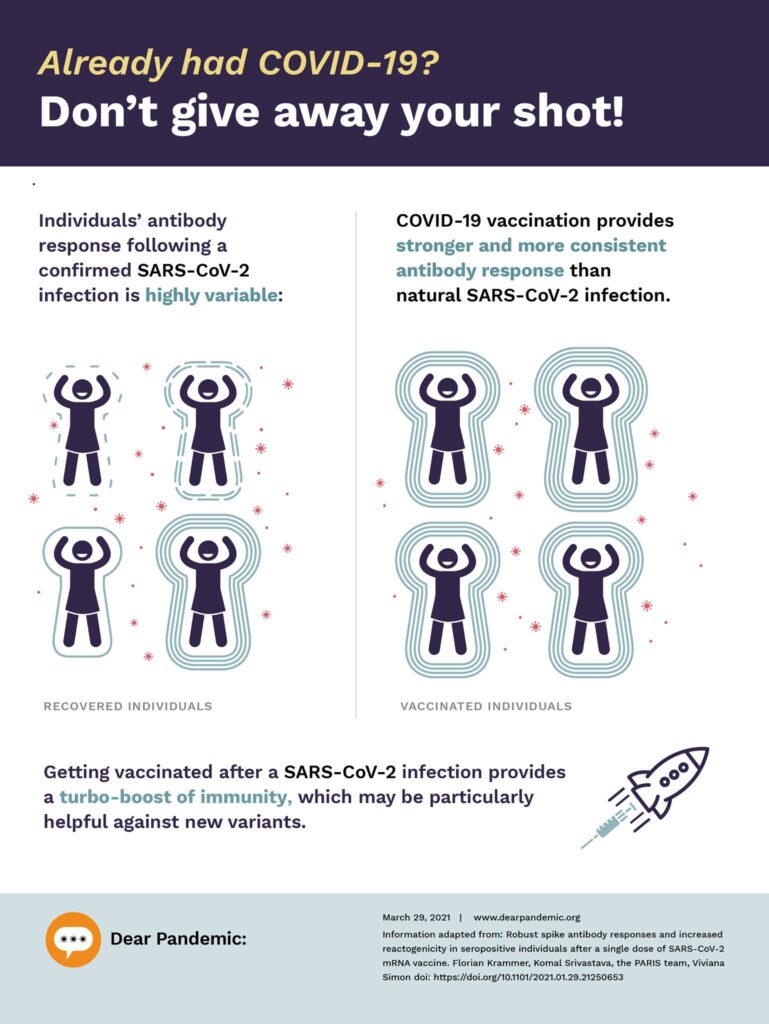A: YES. Vaccination induces a more consistent and robust immune response even in those previously infected.
👉🏽 TL;DR: It is important to get vaccinated even if you have recovered from COVID-19. Vaccination boosts your immune response to COVID-19, giving you additional protection including to new variants..
❓ What do we know about immunity following COVID-19 infection?
In the early days of the pandemic, we did not have much information on whether immunity following recovery from COVID-19 would last. These concerns were based on what we knew about other coronaviruses, such as those that cause the common cold. The common cold coronaviruses don’t induce very strong immune responses which is why we can catch colds every year, and sometimes several times in a single year!
Researchers have been studying the immune response to SARS-CoV-2 in people who have recovered from COVID-19. Most people make an immune response to SARS-CoV-2 infection. People who were sick enough to be hospitalized typically have high levels of antibodies. However, people who had mild illness may not have as strong of an immune response and people who are immunocompromised may have an even weaker immune response. We also know now that SO FAR the immune response persists at least 7-8 months after recovery in some people and offers some protection against re-infection.
❓If that’s the case, why should I get vaccinated if I have previously had COVID-19?
You SHOULD get vaccinated even if you have had COVID-19. Immune protection after COVID-19 infection lasts for some time – how long exactly is not known. And how long it lasts can be different for different people. There are several reasons to get vaccinated even if you have had COVID-19.
➡️ The COVID-19 vaccine boosts the immune response that was developed after infection. This boost leads to stronger immunity that could last longer. Furthermore, the immune response following recovery from COVID-19 is variable, whereas the response to vaccination is consistent.
➡️ While rare, it IS possible to get reinfected with SARS-CoV-2 after having recovered from COVID-19. The robust immune response induced by vaccination provides additional protection from reinfection.
➡️ Studies have shown that the antibody response after vaccination is MUCH higher than the antibody response after COVID-19 infection. This stronger response offers some protection against SARS-CoV-2 variants. Studies have shown that the Pfizer vaccine had an effectiveness rate of 75% against the B.1.135 South African variant and 89.5% against the B.1.1.7 British variant. Although protection against the P.1 Brazilian variant is lower, the vaccines do protect against severe disease. Even though the B.1.1.7 variant is now dominant in the US, COVID-19 cases continue to decrease as the vaccination rate increases, proving that the vaccines work against this variant.
➡️ COVID-19 vaccines may help long haulers. COVID-19 long haulers suffer from ‘brain fog’, continuing shortness of breath, dizziness, fatigue and many other symptoms for months following recovery from COVID-19. As many as 30 to 40% of COVID-19 long haulers noted an improvement in these symptoms after vaccination. While this is still being researched, the vaccines may help to fight off any remaining virus or they may help to reset the immune system and stop harmful immune responses.
💥 BOTTOM LINE:
Vaccines provide a boost of immunity even in those previously infected.
This may be especially important for durability of immunity and protection against new variants.
Stay safe! Get vaccinated!
Love,
Those Nerdy Girls
➡️ Immunity after COVID-19
➡️ COVID-19 vaccines boost response in previously infected people
New England Journal of Medicine
➡️ Vaccines offer protection against variants.
New England Journal of Medicine
➡️ COVID-19 vaccines and long haul COVID



